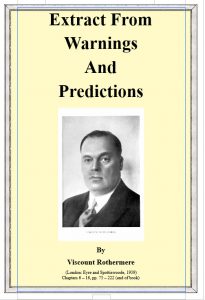WHEN THE VARIOUS LETTERS AND ARTICLES from which I have quoted were written and published, my gloomy prognostications about the coming change in the diplomatic and military status of Britain and Germany were ridiculed.
The German declaration of rearmament in the teeth of the Treaty of Versailles, the re-entry into the Rhinelands, the re-nationalisation of German waterways were treated by Ministers of State and members of the public with extraordinary complacency. Not until Signor Mussolini had shaken all confidence in ‘collective security’ and Herr Hitler had attached to the Reich both Austria and a large part of Czecho-Slovakia, and had threatened the British Empire with war in the process, did my prophecies of 1933 and 1934 cease to be derided.
When Herr Hitler took open power in the January of 1933, I realised that his psychology was very different from that of our own statesmen and very different from that of the men who had led the German republic.
Here was a man whose life had been hard. In boyhood and youth he had been poor and thwarted. In early manhood he had been a serving soldier performing the most dangerous of front-line tasks, those of a battalion runner. He had been decorated for gallantry, had been wounded and gassed. In the years of later manhood he, with other ex-servicemen, had seen his country thrust down into the very mud of world disrepute. He had suffered from the ineptitude of those charged with the Government of his country. He had been affronted by the spectacle of members of an alien race flourishing in Germany and Austria while his own countrymen were in penury. He had attained power only by the use of force combined with a new application of rhetorical and propagandist powers.
